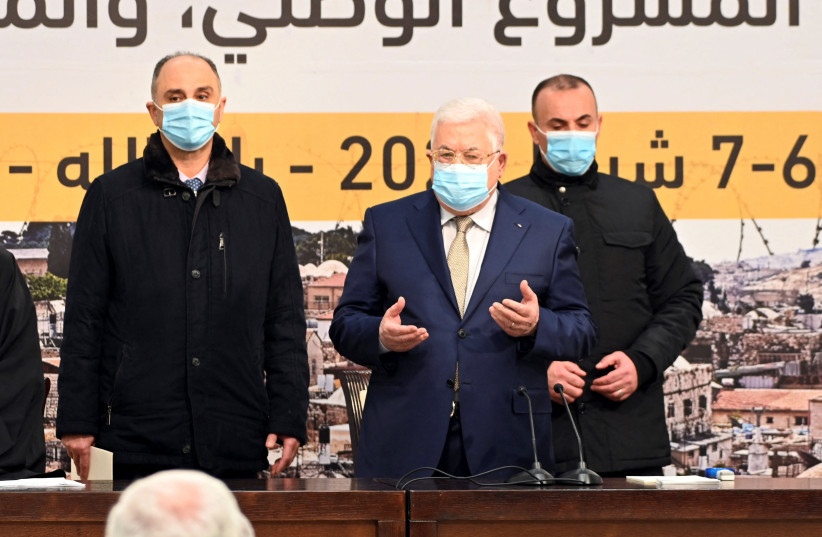Palestinian Authority President Mahmoud Abbas on Monday scored a victory as the Palestinian Central Council (PCC) voted in favor of appointing some of his loyalists to key positions in the Palestinian leadership.
Hussein al-Sheikh, head of the PA General Authority of Civil Affairs, was chosen to replace the late Saeb Erekat, who died in 2020, as secretary-general of the PLO Executive Committee.
Abbas serves as chairman of the PLO Executive Committee and the Fatah Central Committee, two bodies that are now dominated by his loyalists.
The appointment of Sheikh boosts his chances of becoming No. 2 in the Palestinian leadership and a potential successor to Abbas.
Mohammad Mustafa was elected to replace PLO Executive Committee member Hanan Ashrawi, who resigned in 2020 after accusing the Palestinian leadership of marginalizing the PLO and excluding it from decision-making.

Ramzi Rabah was elected to replace veteran PLO Executive Committee member Tayseer Khaled, who submitted his resignation.
The PCC elected Ramzi Khoury as chairman of the Palestinian National Fund, the PLO’s “finance ministry.” Khoury, a longtime confidant of Abbas, was also elected to be a member of the PLO Executive Committee.
The PCC also voted in favor of appointing another Abbas loyalist, Rouhi Fattouh, as speaker of the Palestinian National Council, the PLO’s legislative body and parliament in exile. Fattouh replaced Salim Zanoun, who retired after 30 years in the job.
The PCC decisions were announced at the end of a two-day meeting in Ramallah that was boycotted by several Palestinian factions and figures who had accused Abbas of “hijacking” the Palestinian decision-making bodies and refusing to share powers with others.
Hamas and Palestinian Islamic Jihad, which are not part of the PLO, did not send representatives to the meeting. The two groups had called on Palestinian delegates and factions to boycott the session, saying it would deepen divisions among the Palestinians and sabotage efforts to end the rivalry between Abbas’s Fatah and Hamas.
Palestinian political analysts said the decisions of the PCC would tighten Abbas’s control over the PLO and other major institutions and pave the way for his loyalists to play a significant role in the post-Abbas era.
“This is a big victory for President Abbas,” said one analyst. “It is also a major blow to his rivals, especially those within the PLO and Fatah.”
Other analysts denounced the PCC decisions as a “crime” against the Palestinians and said those elected do not represent the Palestinians.
In a speech before the PCC on Sunday night, Abbas accused Israel of “undermining the two-state solution” and said that “options remain open.”
“It is not possible to continue implementing agreements [with Israel] unilaterally, and our contacts with the Israeli side are not a substitute for a political solution based on international legitimacy,” he said.
The Palestinians will continue to work with the US administration to strengthen bilateral relations, Abbas said.
“We are still waiting for the implementation of its commitments to protect the two-state solution and the signed agreements,” he said, referring to Washington’s pledge to reopen the US Consulate in Jerusalem that was closed in 2018.
